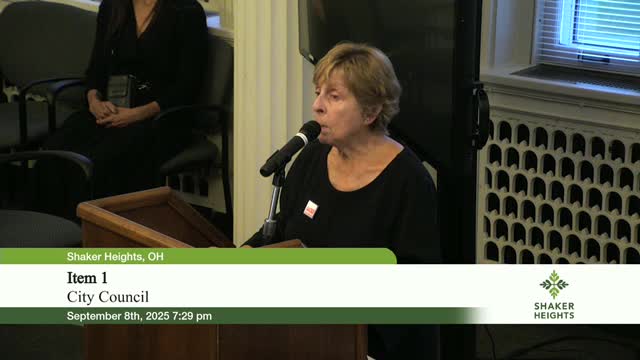Cleveland Heights Council Defies Mayor's Budget With Temporary Three-Month Financial Plan
September 08, 2025 | Shaker Heights City Council, Shaker Heights, Cuyahoga County, Ohio
This article was created by AI summarizing key points discussed. AI makes mistakes, so for full details and context, please refer to the video of the full meeting. Please report any errors so we can fix them. Report an error »

In a recent Shaker Heights City Council work session, discussions highlighted the importance of solidarity in local governance, drawing parallels to historical lessons on unity in the face of adversity. The meeting underscored the need for collaboration among council members to effectively serve the community, especially in light of challenges faced by neighboring Cleveland Heights.
Council members reflected on the struggles of Cleveland Heights, where the mayor's leadership faced significant criticism and turmoil, leading to the resignation of key city officials. In response, the city council took decisive action, rejecting the mayor's proposed budget and instead implementing a temporary budget to ensure city services continued without interruption. This move was characterized by a strong sense of unity among council members, who prioritized the needs of their constituents over political discord.
The discussion emphasized the critical role of local governance in maintaining democratic processes and the importance of standing together against potential mismanagement. Council President Tony Cuda and Vice President Davida Russell, along with other council members, were commended for their leadership during this tumultuous period. Their actions serve as a reminder of the power of collective decision-making in local government.
Additionally, the meeting featured remarks from Greg Coleridge, co-director of the national Move to Amend campaign, who addressed the ongoing influence of corporate power in politics. He highlighted the need for continued vigilance against the corrupting effects of money in elections, urging local organizations and citizens to remain engaged and united in their efforts to promote democratic integrity.
As Shaker Heights navigates its own governance challenges, the lessons learned from neighboring communities may serve as a guiding framework for fostering resilience and solidarity among its leaders and residents. The council's commitment to collaboration and accountability will be crucial as they move forward, ensuring that the needs of the community remain at the forefront of their decision-making processes.
Council members reflected on the struggles of Cleveland Heights, where the mayor's leadership faced significant criticism and turmoil, leading to the resignation of key city officials. In response, the city council took decisive action, rejecting the mayor's proposed budget and instead implementing a temporary budget to ensure city services continued without interruption. This move was characterized by a strong sense of unity among council members, who prioritized the needs of their constituents over political discord.
The discussion emphasized the critical role of local governance in maintaining democratic processes and the importance of standing together against potential mismanagement. Council President Tony Cuda and Vice President Davida Russell, along with other council members, were commended for their leadership during this tumultuous period. Their actions serve as a reminder of the power of collective decision-making in local government.
Additionally, the meeting featured remarks from Greg Coleridge, co-director of the national Move to Amend campaign, who addressed the ongoing influence of corporate power in politics. He highlighted the need for continued vigilance against the corrupting effects of money in elections, urging local organizations and citizens to remain engaged and united in their efforts to promote democratic integrity.
As Shaker Heights navigates its own governance challenges, the lessons learned from neighboring communities may serve as a guiding framework for fostering resilience and solidarity among its leaders and residents. The council's commitment to collaboration and accountability will be crucial as they move forward, ensuring that the needs of the community remain at the forefront of their decision-making processes.
View full meeting
This article is based on a recent meeting—watch the full video and explore the complete transcript for deeper insights into the discussion.
View full meeting
